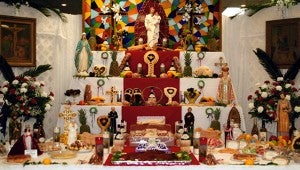Tradition behind St.Joseph Altar
Published 7:00 am Saturday, March 22, 2014

ST. JOSEPH ALTAR: The Feast of St. Joseph began in Sicily in gratitude to St. Joseph for answered prayers for rain to end a drought. Above the St. Joseph Altar at St. Charles Borromeo Catholic Church.
Photo submitted
The St. Joseph Altar or St. Joseph Table was on display and open for visitation at St. Charles Borromeo Catholic Church on March 16.
The tradition originated in Sicily as a result of answered prayers to end a drought that brought a famine to the region, said Jim Seghers. Seghers has been a teacher of Sacred Scripture and Apologetics, the defense of the Catholic faith, for the past 22 years and is the RCIA director at St. Charles Borromeo Catholic Church.
St. Joseph is the patron of those in need—workers, travelers, the persecuted, the poor, the aged, and the dying.
Because the people pleaded to him for relief, and their prayers were answered, they prepared a table with a special assortment of foods they had harvested. After a special mass and blessing of the food, paying honor to St. Joseph, they distributed the food to the needy.
It is interesting to note that no meat is placed on the alter, because the Feast falls during lent.
Seghers said the first St. Joseph Altar was said to be small, but as time went on the altars and amount of food grew larger and more ornate.
The quality of the breads, cookies and pastries, which are baked in a variety of symbolic forms are as much an art form as they are tasty.
The altar is also a way to present prayer petitions for special needs or thanksgiving. The petitions are placed in a basket among the food offerings.
St. Joseph Altars can be found in homes and businesses as well. And not just the homes of those who practice the Catholic faith.
In the Midwest and New England, Americans of Polish ancestry who have the name Joseph celebrate Saint Joseph’s Day (Dzien Swietego Jozefa) as an imieniny, (Polish for special name day). It is a symbol of their ethnic pride, and is done in solidarity with their Italian counterparts.
Today, the altar continues to be a symbol of gratitude and hope. When it is taken down, the food and money is distributed to those in need and the centuries old tradition continues.



